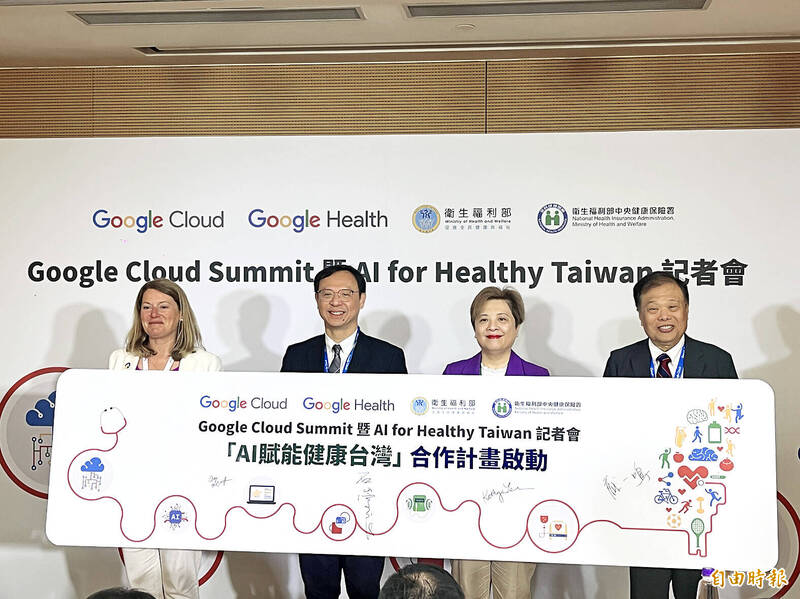《TAIPEI TIMES》 NHIA, Google unveil AI diabetes care program

Representatives from Google and the National Health Insurance Administration hold a news conference in Taipei yesterday. Photo: Hsu Tzu-ling, Taipei Times
ENHANCED HEALTHCARE: The tailored AI models are expected to help the NHIA refer patients with type 2 diabetes to medical facilities for early intervention
By Hsu Tzu-ling and Esme Yeh / Staff reporter, with staff writer
The National Heath Insurance Administration (NHIA) and Google yesterday announced a five-year collaborative program to incorporate artificial intelligence (AI) into the risk management of chronic diseases, which is unprecedented in Taiwan and also Google’s first collaboration with a national government in the healthcare field.
At its initial stage, the program aims to develop an AI that can better predict and manage complication risks for 2 million Taiwanese with type 2 diabetes, which is one of the most common and costly chronic diseases, with the three highs — high blood pressure, high blood sugar and high cholesterol — to be tackled next.
The program is part of the government’s precision medicine strategy, to apply Google Cloud’s AI tools and Google Health’s clinical information to integrated health management.
The NHIA is to adopt Google’s MedLM models on Vetex AI to train and test tailored generative AI models, with the aim of identifying complication risks for patients with type 2 diabetes several years earlier, said Amy McDonough, managing director and general manager of Fitbit Health Solutions at Google.
These tailored AI models are expected to help the NHIA refer patients with type 2 diabetes to medical facilities for early intervention and, combined with wearable devices connected to digital medical solutions, assist doctors in understanding their daily life, thus enhancing healthcare management outcomes, McDonough said.
NHIA Director-General Shih Chung-liang (石崇良) said that the collaboration has three goals.
The National Health Research Institutes is to capitalize on Google Cloud’s tools to optimize AI-powered models for predicting chronic disease risks, Shih said.
The calculated results would be provided to medical facilities to monitor patients and build individualized treatment plans, as well as for patients to understand their condition, he said.
The use of AI-powered models would then help implement a hierarchy of medical care by distinguishing between high and low-risk patients, and determining the extent of required medical intervention, he added.
Personal data of patients would be anonymized and turned into secondary data by the NHIA prior to cloud processing and storage at Google’s data center in Changhua County to ensure the highest degree of protection, Shih said.
新聞來源:TAIPEI TIMES
















